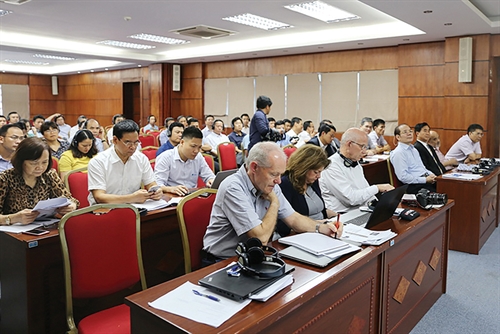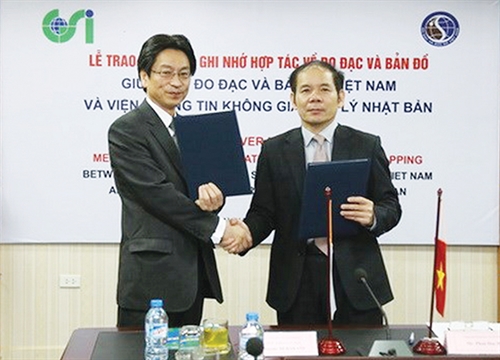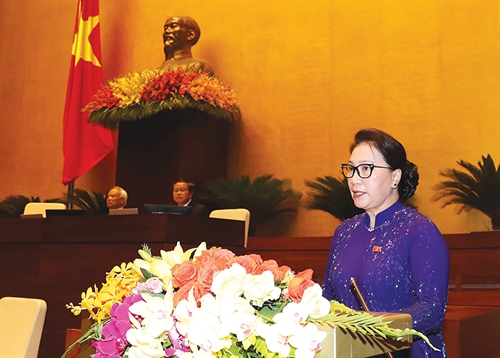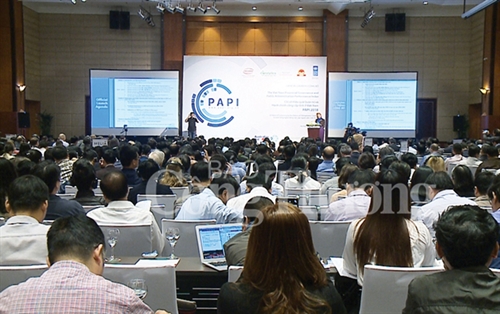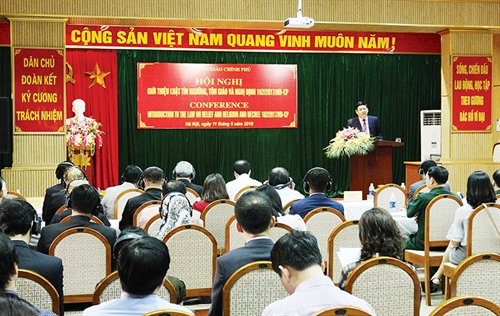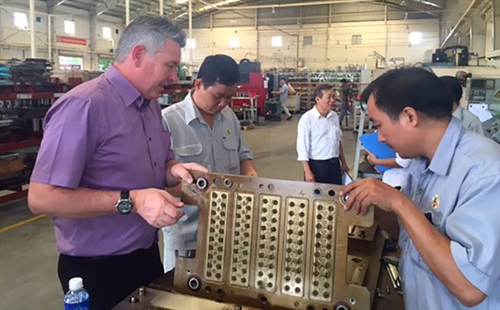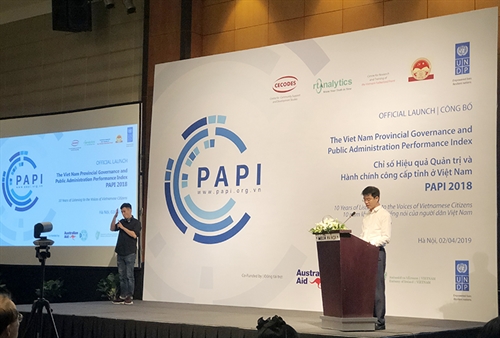 |
The EU-Vietnam Free Trade Agreement (EVFTA) has recently been signed amidst the sound Vietnam-EU partnership, especially in economy and trade. This is a comprehensive and high-quality deal which has taken into consideration differences in development levels between the two sides, Minister of Industry and Trade Tran Tuan Anh said in an interview granted to the Vietnam News Agency.
Can you tell me the purposes and significance of Vietnam’s signing of the EVFTA?
The EVFTA is a new-generation FTA with high-quality and comprehensive standards, conforming with the rules of the World Trade Organization (WTO).
So far, we have signed a total of 12 bilateral and multilateral FTAs with foreign partners. However, the EVFTA is of extreme significance to Vietnam’s economy as it will help us improve the country’s competitive edge in Europe and join new value chains.
Almost all Vietnamese exports to the EU will see import tariffs lifted gradually following a short roadmap. It is the highest commitment so far from a partner to Vietnam in an FTA.
Moreover, in the trade, service and investment areas, our commitments in the EVFTA are higher than those in the WTO, in parallel with the EU’s highest commitments in the FTAs it has signed recently.
Apart from removing tariff barriers, the trade deal also covers a wide range of areas, from trade in goods, government procurement, trade remedies, and intellectual property. Therefore, the agreement would not only boost the two-way trade value but also help our country improve its competitive capacity and join new value chains.
In terms of government procurement, Vietnam and the EU agree that the contents would be equivalent to those in the WTO Agreement on Government Procurement. In addition, our commitments on intellectual property in the EVFTA are consistent with current regulations. With all of Vietnamese Geographical Indications (GIs) being related to agricultural products and food, a number of agricultural products will therefore have great chances of brand development in the EU market.
Once the EVFTA takes effect, we will grant protection to over 160 EU GIs while the EU will do the same with 39 Vietnamese GIs. The agreement also contains chapters on competition, state-owned enterprises, sustainable development, cooperation and capacity building, and legal and institutional provisions. These contents are consistent with our legal system, creating a legal framework for the two sides to foster cooperation and development of bilateral trade and investment.
The EVFTA and the EU-Vietnam Investment Protection Agreement (EVIPA) have been officially signed amidst the sound Vietnam-EU partnership. What must Vietnam and EU do in the coming time to implement the agreements?
The EVFTA still needs to be ratified by parliaments of each side and Vietnam will have to go through another process of ratification to officially make it effective. Whether this process can be short or lengthy, it depends on the efforts of both Vietnam and the EU.
With the spirit and efforts both sides have demonstrated in the negotiation process, I believe that our concerned agencies and those in the EU will complete the ratification at the soonest time.
The EVFTA only needs the EU’s consent while the EVIPA will take longer to come into force due to the requirement for all EU member states’ ratification. However, as all the EU member states have approved the signing of both EVFTA and EVIPA, this would certainly facilitate the ratification.
Apart from great opportunities, many are concerned that the EVFTA may also pose challenges for domestic enterprises. What is your opinion on this issue and what should Vietnamese businesses prepare to overcome the challenges?
The negotiations of the EVFTA have been concluded after six years. The deal, expected to be a growth leverage, would open up opportunities for Vietnamese enterprises to enter the EU market of 508 million consumers, with a combined GDP of about USD 18 trillion.
Of course, the implementation of the EVFTA also poses many challenges, especially when ours is an economy with the lowest development level compared to other countries that have signed FTAs with the EU. Therefore, competitive pressure is the biggest challenge for our economy and enterprises.
It will be a harsh competition for weak enterprises, especially enterprises that still rely on subsidies from the State and those with outdated production and business technologies.
On the other hand, competition will encourage enterprises’ continuous innovation activities and, at the same time, give more choices for consumers. Moreover, new areas of commitments in the EVFTA also require amendments to our legal system.
Recently, the National Assembly has proactively set a roadmap to amend several important legal documents such as the Labor Code and the Law on Intellectual Property, among others, to make active preparations for the integration process, including the implementation of the EVFTA.
With the EU being one of the most demanding markets in the world, the successful overcoming of tariff barriers does not guarantee that our goods and services would be accepted.
This is due to the fact that many EU regulations attach importance to not only product standards but also the production process of such product (for example, aquatic products illegally fished or timber harvested from natural forests without permission are/is prohibited). Moreover, the EU requirements regarding labor and environment are also among the highest worldwide.
Therefore, local businesses and state management agencies must work harder to overcome the challenges and make use of the opportunities from the EVFTA. Businesses must make proactive preparations in order to benefit most from the trade deal.
Specifically, enterprises must study opportunities and challenges of the EU market, and solutions for improving quality and product designs to make full use of their competitive advantages and increase productivity. On the other hand, to take advantage of the deal, they must ensure product quality meeting the EU’s requirements on rules of origin, technical standards, and sanitary and phytosanitary requirements.
What advantages of FTAs should Vietnam take to boost economic growth in the coming time?
Currently, our country has implemented 11 FTAs, including the intra-regional FTA among 10 ASEAN countries; 6 FTAs between ASEAN and China, South Korea, Japan, India, Australia and New Zealand; four bilateral agreements with Japan, Chile, South Korea and the Eurasian Economic Union, and recently the Comprehensive and Progressive Agreement for Trans-pacific Partnership (CPTPP).
Of these, most of our goods enjoy the zero tax rate when exported to ASEAN countries (over 95 percent of the tariff), China (more than 90 percent of the tariff), and South Korea (more than 75 percent of the tariff). The remaining countries are continuing to cut down tax according to the commitments. This is the advantage that businesses should take when exporting their products to these markets.
In the near future, the enforcement of the EVFTA together with the CPTPP Agreement and the signing of some other agreements are expected to bring more advantages, laying the foundation for Vietnam’s economic growth.
Specifically, these agreements will help Vietnam implement its policy of diversifying economic and trade relations, especially diversifying import and export markets, avoiding excessive dependence on a single region. In addition, boosting exports will also create more jobs, support the process of economic restructuring and reform the growth model.
On the other hand, the connection through the agreements will create favorable conditions for our businesses to promote economic efficiency in terms of scale to increase productivity and reduce production costs, lowering their commodity prices for better competitiveness. In addition, the links between Vietnamese enterprises and those in ASEAN, EU or CPTPP members will also be formed through division of labor, exchange of goods and intermediary services, thereby creating more business opportunities for Vietnamese enterprises.
This process will help our enterprises develop together, meeting the demand for consumption of goods and services in the region and entering such developed markets as the EU, Japan, South Korea and Canada. The successful negotiation and signing of FTAs with major partners will heighten Vietnam’s image in the world stage, creating a new push for economic growth in the long term.- (VLLF)

